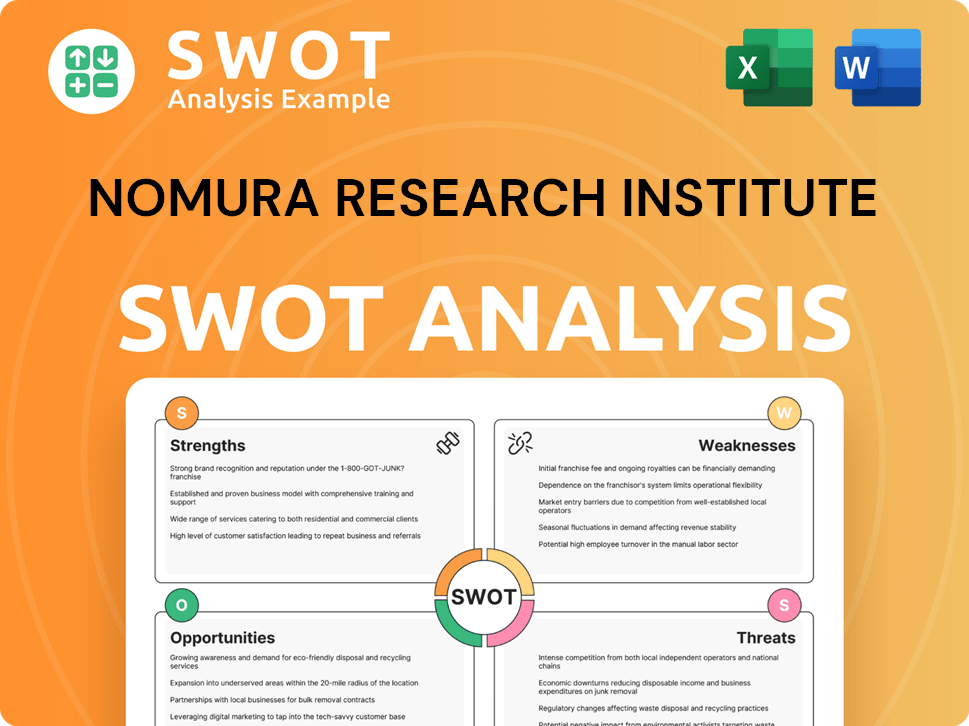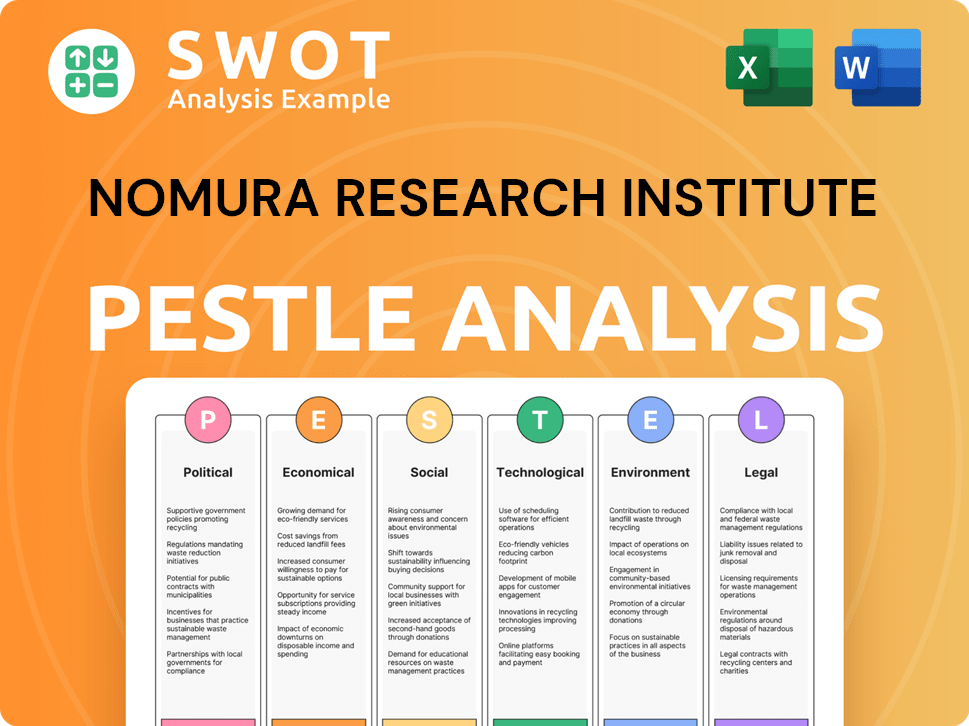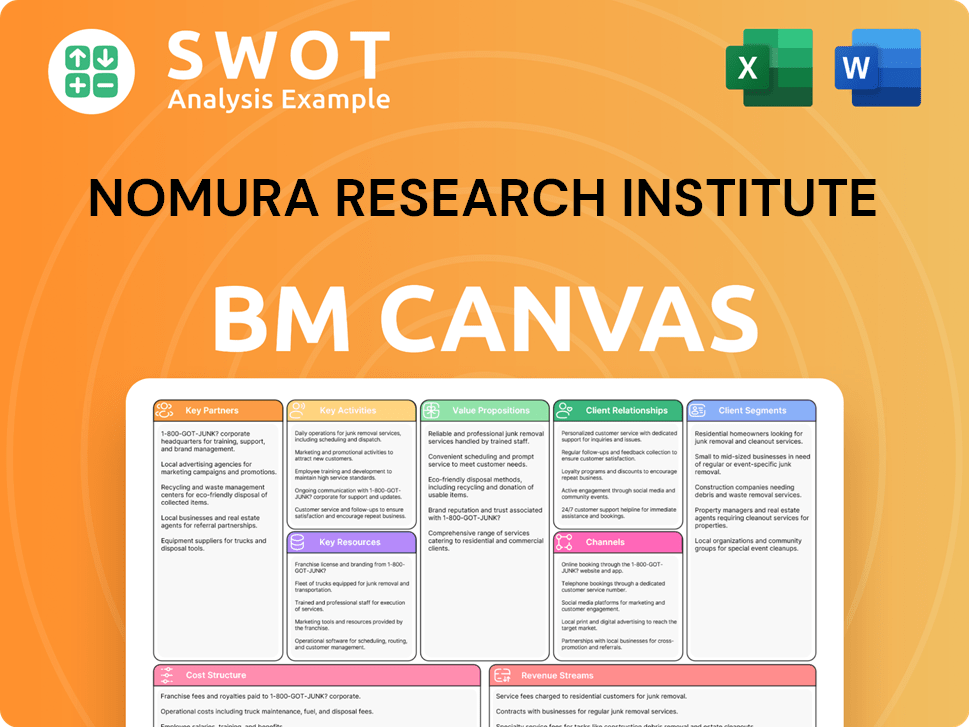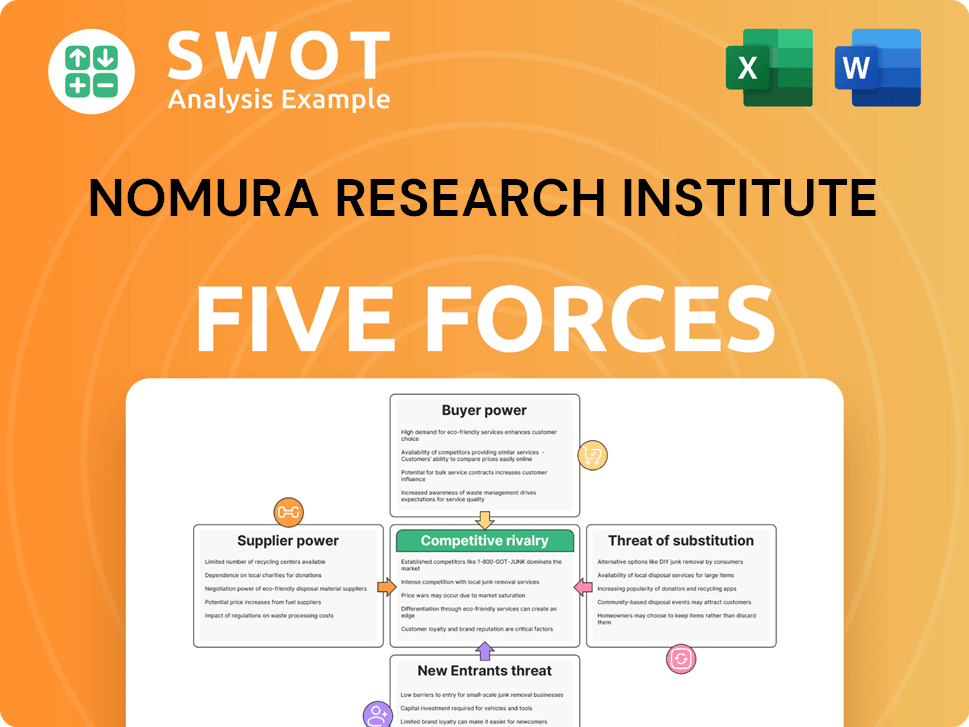Nomura Research Institute Bundle
How Does Nomura Research Institute Thrive in a Competitive Market?
The consulting and IT services sector is a battlefield of innovation, and Nomura Research Institute SWOT Analysis reveals its strategies. With rapid technological advancements reshaping client needs, understanding the NRI competitive landscape is crucial. This analysis dives into NRI's key rivals and differentiators.

This deep dive into NRI market analysis will uncover its strategic positioning within the IT consulting Japan landscape. We'll explore how NRI maintains its competitive edge, examining its financial services research and the strategies it uses to navigate digital transformation. Gaining insights into NRI's business strategy and competitor comparison will provide a comprehensive understanding of its success.
Where Does Nomura Research Institute’ Stand in the Current Market?
Nomura Research Institute (NRI) holds a strong market position, particularly in Japan's consulting and IT services sectors. Its services span management consulting, system integration, IT management, and industrial IT solutions, catering to a wide range of clients, including financial institutions and government entities. As of the fiscal year ending March 2024, NRI demonstrated robust financial performance, underscoring its significant scale within the industry and its continued growth trajectory.
NRI's core operations revolve around providing high-value-added services, leveraging deep industry knowledge and technological prowess. This includes a focus on digital transformation initiatives, cloud computing, and cybersecurity solutions. The company has been actively expanding its international footprint through strategic acquisitions and partnerships to support its global clients, reflecting a deliberate shift to diversify revenue streams and enhance its global service delivery capabilities.
The value proposition of NRI lies in its ability to deliver comprehensive solutions that address the complex needs of its clients, particularly in the financial services sector. By integrating consulting, IT solutions, and research capabilities, NRI helps clients improve operational efficiency, drive innovation, and achieve their strategic goals. The company's commitment to research and development and its extensive talent pool further solidify its market standing, as highlighted in the Growth Strategy of Nomura Research Institute.
NRI consistently ranks among the top-tier providers in Japan's consulting and IT services sectors. While specific global market share figures can fluctuate, the company's strong domestic presence is undeniable. For the fiscal year ending March 2024, NRI projected net sales of 735.0 billion yen, indicating continued growth and a healthy financial outlook.
NRI's geographic presence is primarily concentrated in Japan, where it serves a vast customer base. However, the company is expanding its international footprint, particularly in Asia, North America, and Europe. This expansion supports its global clients and diversifies revenue streams. Strategic alliances and acquisitions play a key role in this expansion.
NRI's primary product lines include management consulting, system integration, IT management and solutions, and industrial IT solutions. These services cater to a broad spectrum of clients, including financial institutions, corporations, and government entities. The focus is on integrated, high-value-added services.
Compared to industry averages, NRI demonstrates strong financial health, often characterized by stable revenue growth and profitability. The company's significant investment in research and development, coupled with its extensive talent pool, further solidifies its market standing. Strong performance is noted in financial services research.
NRI's competitive advantage stems from its strong domestic presence in Japan, diversified service offerings, and focus on high-value-added solutions. The company's ability to leverage deep industry knowledge and technological expertise positions it well in the market. NRI's strategic moves towards digital transformation and cloud computing further solidify its market standing.
- Strong domestic market share in Japan.
- Diversified service offerings across consulting and IT solutions.
- Focus on digital transformation and cloud computing.
- Strategic expansion in Asia, North America, and Europe.
Nomura Research Institute SWOT Analysis
- Complete SWOT Breakdown
- Fully Customizable
- Editable in Excel & Word
- Professional Formatting
- Investor-Ready Format

Who Are the Main Competitors Challenging Nomura Research Institute?
The Brief History of Nomura Research Institute reveals a competitive landscape shaped by a diverse set of players. This includes global consulting giants and specialized IT service providers. Understanding the dynamics of this environment is crucial for assessing the company's position and future prospects. The competitive landscape analysis provides insights into the challenges and opportunities facing the company.
The NRI competitive landscape is complex, involving both direct and indirect competitors across various business segments. The company's success depends on its ability to differentiate itself and adapt to evolving market conditions. This analysis considers the key competitors, their strategies, and the broader industry trends impacting the company.
In the management consulting space, Nomura Research Institute (NRI) competes with major international firms. These include Accenture, Deloitte Consulting, PwC, and IBM Consulting. These firms offer broad consulting services, often leveraging their global networks and deep industry expertise to attract multinational clients. For instance, Accenture, with its vast global reach and strong focus on digital transformation, directly challenges NRI in large-scale IT consulting and system integration projects.
Key competitors in management consulting include global firms like Accenture, Deloitte, PwC, and IBM. These companies offer a wide range of services and often compete for large, multinational projects. They leverage their global networks and industry expertise.
In the IT solutions and system integration market, NRI faces competition from large Japanese IT service providers. These include NTT Data, Hitachi, and Fujitsu, as well as global players like Capgemini and Cognizant. These companies compete on price, technology, and talent.
New and emerging players in niche areas like cloud computing and AI are reshaping the competitive landscape. Smaller tech companies and specialized consultancies can disrupt traditional markets. Mergers and alliances also alter competitive dynamics.
Companies compete on various factors, including price, technological innovation, delivery capabilities, and talent acquisition. High-profile projects like digital transformation and ERP system implementations are key battlegrounds. The ability to attract and retain top talent is crucial.
The industry is influenced by mergers, technological advancements, and shifts in client needs. These changes require continuous monitoring and adaptation to maintain a competitive edge. Understanding these dynamics is essential for strategic planning.
To succeed, NRI must continuously monitor market shifts and adapt its strategies. This includes focusing on innovation, client relationships, and talent development. Staying ahead of competitors requires a proactive approach.
Within the IT solutions and system integration market, NRI's key competitors include large Japanese IT service providers like NTT Data, Hitachi, and Fujitsu, as well as global players such as Capgemini and Cognizant. NTT Data, for instance, is a dominant force in public sector IT and financial services in Japan, often engaging in direct competition with NRI for major government and banking contracts. These companies compete on various fronts, including price, technological innovation, delivery capabilities, and the ability to attract and retain top talent. High-profile 'battles' often emerge around large-scale digital transformation projects or the implementation of complex enterprise resource planning (ERP) systems.
The NRI market analysis reveals several key factors that drive competition. These factors include price, technological innovation, and the ability to attract top talent. The competitive landscape is also influenced by strategic alliances and mergers within the industry.
- Price: Competitive pricing strategies are crucial for winning contracts, especially in large-scale projects.
- Technological Innovation: Investing in cutting-edge technologies like AI and cloud computing is essential for staying competitive.
- Delivery Capabilities: Efficient project management and reliable service delivery are critical for client satisfaction.
- Talent Acquisition and Retention: Attracting and retaining skilled professionals is vital for maintaining a competitive edge.
- Strategic Alliances: Forming partnerships can expand capabilities and market reach.
Nomura Research Institute PESTLE Analysis
- Covers All 6 PESTLE Categories
- No Research Needed – Save Hours of Work
- Built by Experts, Trusted by Consultants
- Instant Download, Ready to Use
- 100% Editable, Fully Customizable

What Gives Nomura Research Institute a Competitive Edge Over Its Rivals?
Understanding the competitive advantages of Nomura Research Institute (NRI) is crucial for a comprehensive NRI market analysis. NRI distinguishes itself through a blend of deep industry expertise, an integrated service model, and a strong brand reputation. These factors collectively position NRI favorably within the NRI competitive landscape, enabling it to capture and retain a significant market share.
NRI's success is also reflected in its financial performance. While specific figures can fluctuate, the company consistently demonstrates strong revenue and profitability. For instance, in recent years, NRI has shown a steady increase in its global presence, expanding its operations and client base. This growth is a testament to its effective business strategies and the value it delivers to its clients. For more information, you can check out the Revenue Streams & Business Model of Nomura Research Institute.
The company's focus on innovation, especially in areas like AI and blockchain, ensures its continued relevance in a rapidly evolving market. This commitment, coupled with strategic investments in talent and global expansion, solidifies its position as a leader in the IT consulting and financial services research sectors.
NRI's expertise, particularly in the financial sector, is a core strength. This advantage stems from its origins with Nomura Securities, providing an unparalleled understanding of financial markets. This deep-rooted knowledge fosters strong client relationships and enables the development of highly specialized solutions, supporting NRI financial performance.
NRI's integrated service model combines management consulting with IT solutions and system integration. This holistic approach allows NRI to offer end-to-end services. This integrated model provides a more efficient experience, enhancing client satisfaction and project success rates, which is a key factor in NRI business strategy.
NRI's strong brand equity and reputation for reliability, especially within Japan, contribute significantly to its competitive standing. The company's commitment to research and development ensures that it remains at the forefront of technological innovation. This brand strength supports NRI market share analysis.
NRI continuously invests in talent development and global expansion to ensure sustainability. For example, NRI's focus on developing solutions for emerging technologies like AI and blockchain demonstrates its proactive approach to maintaining a technological edge. This forward-thinking approach is crucial for navigating NRI industry trends.
NRI's competitive advantages include deep industry expertise, an integrated service model, and a strong brand reputation. These strengths enable NRI to deliver comprehensive solutions, driving client success and supporting long-term relationships. Understanding these advantages is essential for any NRI competitor comparison.
- Deep Industry Expertise: Strong understanding of financial markets and regulatory environments.
- Integrated Service Model: Combines consulting, IT solutions, and system integration.
- Strong Brand Equity: Reputation for reliability and quality, particularly in Japan.
- Innovation Focus: Commitment to research and development in emerging technologies.
Nomura Research Institute Business Model Canvas
- Complete 9-Block Business Model Canvas
- Effortlessly Communicate Your Business Strategy
- Investor-Ready BMC Format
- 100% Editable and Customizable
- Clear and Structured Layout

What Industry Trends Are Reshaping Nomura Research Institute’s Competitive Landscape?
The NRI competitive landscape is shaped by the dynamic IT services and consulting industry. The company faces both challenges and opportunities stemming from technological advancements, evolving client needs, and the global economic climate. An understanding of industry trends, potential risks, and future prospects is crucial for evaluating NRI market analysis and its strategic positioning.
NRI market analysis reveals that the company's success hinges on its ability to adapt to rapid technological changes and maintain a competitive edge. Staying ahead of the curve in areas like cloud computing, data analytics, and cybersecurity is essential. Furthermore, NRI's ability to foster innovation and form strategic alliances will be critical for future growth and market diversification. For more insights, you can explore the Owners & Shareholders of Nomura Research Institute.
The IT consulting and services sector is driven by digital transformation, cloud adoption, and the rise of data analytics. Demand for cybersecurity is increasing, necessitating robust compliance frameworks. These trends create opportunities for companies like Nomura Research Institute.
Rapid technological evolution requires continuous investment in R&D and talent acquisition. The shortage of skilled IT professionals in areas like AI and cybersecurity poses a challenge. Increased regulatory scrutiny, especially in data privacy, adds complexity to service delivery.
Emerging markets, particularly in Asia, offer significant growth potential. Product innovations, such as industry-specific AI solutions, present avenues for expansion. Strategic partnerships and acquisitions can accelerate growth and market diversification for NRI.
Continued investment in core competencies and fostering innovation are vital. Strategic global expansion and adapting to changing business models are key. Leveraging expertise in financial services to support digital transformation in other industries is a key growth opportunity.
NRI's future depends on several key areas. These include expanding its service offerings, forming strategic alliances, and focusing on emerging markets. The company must also address challenges such as talent acquisition and regulatory compliance.
- Focus on AI and Data Analytics: Developing industry-specific AI solutions and advanced data analytics platforms can expand service offerings.
- Strategic Partnerships: Collaborating with companies with cutting-edge technologies and strong regional presence can accelerate growth.
- Global Expansion: Targeting emerging markets, especially in Asia, where digitalization efforts are still nascent, presents significant opportunities.
- Talent Development: Investing in training and development programs to address the shortage of skilled IT professionals.
Nomura Research Institute Porter's Five Forces Analysis
- Covers All 5 Competitive Forces in Detail
- Structured for Consultants, Students, and Founders
- 100% Editable in Microsoft Word & Excel
- Instant Digital Download – Use Immediately
- Compatible with Mac & PC – Fully Unlocked

Related Blogs
- What are Mission Vision & Core Values of Nomura Research Institute Company?
- What is Growth Strategy and Future Prospects of Nomura Research Institute Company?
- How Does Nomura Research Institute Company Work?
- What is Sales and Marketing Strategy of Nomura Research Institute Company?
- What is Brief History of Nomura Research Institute Company?
- Who Owns Nomura Research Institute Company?
- What is Customer Demographics and Target Market of Nomura Research Institute Company?
Disclaimer
All information, articles, and product details provided on this website are for general informational and educational purposes only. We do not claim any ownership over, nor do we intend to infringe upon, any trademarks, copyrights, logos, brand names, or other intellectual property mentioned or depicted on this site. Such intellectual property remains the property of its respective owners, and any references here are made solely for identification or informational purposes, without implying any affiliation, endorsement, or partnership.
We make no representations or warranties, express or implied, regarding the accuracy, completeness, or suitability of any content or products presented. Nothing on this website should be construed as legal, tax, investment, financial, medical, or other professional advice. In addition, no part of this site—including articles or product references—constitutes a solicitation, recommendation, endorsement, advertisement, or offer to buy or sell any securities, franchises, or other financial instruments, particularly in jurisdictions where such activity would be unlawful.
All content is of a general nature and may not address the specific circumstances of any individual or entity. It is not a substitute for professional advice or services. Any actions you take based on the information provided here are strictly at your own risk. You accept full responsibility for any decisions or outcomes arising from your use of this website and agree to release us from any liability in connection with your use of, or reliance upon, the content or products found herein.